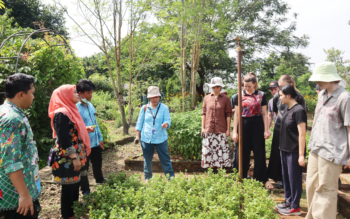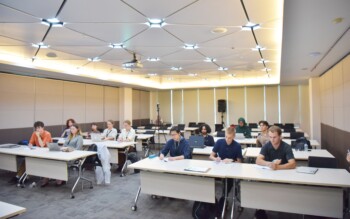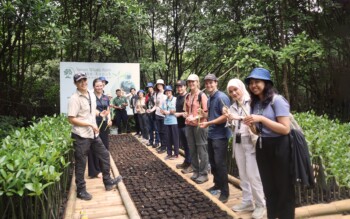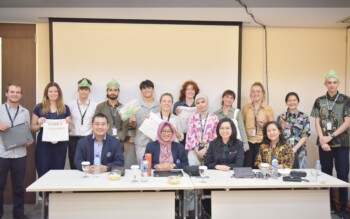APP comprised a 2-week academic program held at Atma Jaya University, featuring seminars, tutorials, and field trips focused on the agriculture in Indonesia. Simultaneously, we received a total of 40 hours of Indonesian language classes to not only prepare us for our internship but also to enhance our weekend leisure experiences in Indonesia.
Throughout the seminars, we heard from a diverse range of speakers including government officials, private sector representatives, a founder of a consulting businesses, and NGO officers. These sessions introduced us to Indonesian agriculture, its current challenges, and future objectives such as enhancing self-sufficiency in agricultural production. Following each seminar, tutorials provided an opportunity for us, coming from diverse academic backgrounds including agronomy, animal science, environmental conservation, food science, economics, and biotechnology, to compare agricultural practices between Indonesia and Australia from these various perspectives, analyze potential solutions, and engage in enriching discussions.


The language classes were equally enjoyable as the sense of camaraderie and mutual motivation among classmates made the learning process rewarding. Testing each other’s’ Bahasa outside classes, practicing it with the local Indonesian people in restaurants and in accommodations was fun and at the same time helped me to enforce my Indonesian language skills.
Field trips to the mangrove forest (Taman Wisata Alam Mangrove Angke) and sustainable teaching farm (Agro Edukasi Wisata Ragunan) offered insights into local agricultural practices. Pasteurizing fresh milk to make chocolate milk, eating various vegetables and herbs from the garden with my fellow APP cohort were memorable experiences and this practical way of broadening our understanding of Indonesian agriculture solidified our learning from the seminars and tutorials.
Every aspect of the program provided opportunities for new learning and cultural exchange. From crafting batik in a workshop to exploring the supply chain of Australian live cattle exports during the 4-week internship with AUSTREX, each experience added depth to my understanding of agriculture and its interconnectedness with the society.


My internship placement with AUSTREX was a remarkable experience. The internship was structured to begin with presentations about the company’s overview and guided research studies, setting the foundation for our industry knowledge. Subsequently, we had the opportunity to visit various key components of the supply chain, including feedlots, slaughterhouses, wet markets, and modern retail outlets. During these visits, we were encouraged to ask questions and engage in discussions, which facilitated rapid learning. Interacting with operational staffs from different parts of the supply chain provided valuable insights into the dynamics of the agricultural industry. Additionally, I attended the Forum of Animal Welfare Officers, which included the first-ever national competition on animal welfare knowledge, that showcased the dedication of workers in the livestock export and import industry to uphold high animal welfare standards, supported by collaborative efforts across the industry to encourage the movement.
To conclude the experience, I delivered a speech summarizing my experience at the closing ceremony which allowed me to reflect on my journey and share insights with my peers. Hearing the internship experiences of my fellow APP students in different industries and regions of Indonesia after the closing ceremony further enriched our collective learning.
Overall, my participation in the APP was a fulfilling experience that deepened my knowledge of Indonesian agriculture, Australian live cattle export industry, and made me realise the importance of human relationships to allow collaborations within these contexts. I am grateful for the opportunity and extremely proud of my fellow participants for their dedication and growth, and I genuinely wish them all the best in their future endeavors.
